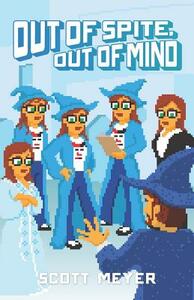You need to sign in or sign up before continuing.
Take a photo of a barcode or cover
I’m horribly conflicted. When I picked up this series I saw it as my bedtime routine audiobook, fluffy and nice and not too awful if you miss a couple minutes while falling asleep. But, it grew on me. I adored book 2 and 3, was a bit bummed by 4.
This book was so promising. It had a ticking time bomb in the form of glitch Brit, but the ending felt unsatisfactory. Honestly, time travel has been shoehorned into this series a lot, so I guess it wasn’t super surprising, just unoriginal. The writing style was amazing like I was used to, it felt like it was really going somewhere, but then it fell flat.
What I found unforgivable though, is that no one called Brit out on her shit. She straight up lied about Philip and programmed that lie into all her timelines. I guess the title of the book is well chosen, but it doesn’t feel like the Brit we know at all. And why didn’t Gwen try to reason with Brit at all? Where was their interaction, anyways? Why are all the other characters backing her? They’re more upset that Philip is moping, than they’re upset with Brit for causing this entire situation. What’s with Martin basically telling Philip to snap out of it? Meyer had many of these characters stretching to the point of it being frustrating to the reader.
I guess I’m mostly bummed because the only thing driving the plot forward was the conflict between the characters, conflict that was manufactured and unnecessary. It had so much promise in the set up from book 4 to 5 and did absolutely nothing with its potential. What a shame.
I’m giving this 3 stars for my overarching appreciation of the world, and the cliffhanger. I’m hoping for a good antagonist in book 6, because this was unfortunately, weak.
This book was so promising. It had a ticking time bomb in the form of glitch Brit, but the ending felt unsatisfactory. Honestly, time travel has been shoehorned into this series a lot, so I guess it wasn’t super surprising, just unoriginal. The writing style was amazing like I was used to, it felt like it was really going somewhere, but then it fell flat.
What I found unforgivable though, is that no one called Brit out on her shit. She straight up lied about Philip and programmed that lie into all her timelines. I guess the title of the book is well chosen, but it doesn’t feel like the Brit we know at all. And why didn’t Gwen try to reason with Brit at all? Where was their interaction, anyways? Why are all the other characters backing her? They’re more upset that Philip is moping, than they’re upset with Brit for causing this entire situation. What’s with Martin basically telling Philip to snap out of it? Meyer had many of these characters stretching to the point of it being frustrating to the reader.
I guess I’m mostly bummed because the only thing driving the plot forward was the conflict between the characters, conflict that was manufactured and unnecessary. It had so much promise in the set up from book 4 to 5 and did absolutely nothing with its potential. What a shame.
I’m giving this 3 stars for my overarching appreciation of the world, and the cliffhanger. I’m hoping for a good antagonist in book 6, because this was unfortunately, weak.
adventurous
dark
mysterious
sad
fast-paced
Plot or Character Driven:
Plot
Strong character development:
No
Loveable characters:
Complicated
Diverse cast of characters:
Complicated
Flaws of characters a main focus:
Yes
Come on, why not? Another funny, action-packed, slightly confusing, and very, very over the top romp through Atlantis with everyone's favourite not-so-wizard computer hacker Martin and the gang of other people who have cracked the "world is a computer program" hack. And Luke Daniels, he's great.
The story isn't much to write home about, it's a bit confusing with all the multiple timeline/characters surrounding Britt, and it kind of ends with more questions than answers (especially with Jimmy) but it was worth a few hours. Some chuckles, a few actual laughs, and again just so many great voices by Daniels!
The story isn't much to write home about, it's a bit confusing with all the multiple timeline/characters surrounding Britt, and it kind of ends with more questions than answers (especially with Jimmy) but it was worth a few hours. Some chuckles, a few actual laughs, and again just so many great voices by Daniels!
Entertaining and had a few interesting ideas, but overall the weakest of the series so far. Starting to get a little tedious at times.
3.5 stars, only rating up because I'll keep reading more, for some reason.
Ugh this book. Not as bad as the last one, but dumb in it's own rights. It follows the trope - cliche - or whatever it is that people don't talk to each other, to create needless drama for filler in the books. It really really is starting to annoy me. But, such is books. Annoying as it is. So yeah, Phillip and Brit both annoyed me, Brit is a bitch. :/ Still, the rest is so entertaining. It's a great series to get lost in for wanting something light and fun.
Ugh this book. Not as bad as the last one, but dumb in it's own rights. It follows the trope - cliche - or whatever it is that people don't talk to each other, to create needless drama for filler in the books. It really really is starting to annoy me. But, such is books. Annoying as it is. So yeah, Phillip and Brit both annoyed me, Brit is a bitch. :/ Still, the rest is so entertaining. It's a great series to get lost in for wanting something light and fun.
adventurous
funny
lighthearted
slow-paced
Plot or Character Driven:
A mix
Strong character development:
Complicated
Loveable characters:
Complicated
Diverse cast of characters:
Complicated
Flaws of characters a main focus:
Yes
I didn't enjoy this as much as the others, not a particularly satisfying ending to this one. As usual the nerdy references were enjoyable but over all not as humorous as the earlier books.
adventurous
funny
medium-paced
Plot or Character Driven:
Character
Strong character development:
Complicated
Loveable characters:
Complicated
Diverse cast of characters:
Yes
Flaws of characters a main focus:
Yes
This originally appeared at The Irresponsible Reader.
---
---
First Things First
I can’t talk about this one without spoiling the end of Fight and Flight. This entire book is built on the foundation of that last chapter. Read at your own risk.
What’s Out of Spite, Out of Mind About?
Let’s get the subplots out of the way (at least one of which is going to turn out to be important for the next book, and one will be important for this one). Gary hires a local peasant—and then several others—in a misguided, but surprisingly good-hearted, attempt to help them out. This is almost entirely a comic storyline, and I love that Meyer takes the time to do things like this.
Martin and Gwen are fighting (which happens a lot, sure)—because they both want to get married, but not right now, and things are awkward because Martin raised the subject. If that seems odd to you, imagine how poor Martin feels. It feels very sitcom-y—if the sitcom is in a later season and is trying to come up with some low-stakes conflict because the writers can’t figure out how to keep happy couples interesting. I rolled my eyes at this stuff a lot—but found it a little amusing. Where this storyline resolved, however, might end up being the most grounded, mature, and admirable thing in this series.*
* Wow, I’m supposed to keep my evaluative-powder dry in this section. Whoops. Feel free to call our Customer Service line for a full refund.
The third subplot also involves Martin (he’s our point-of-entry character for this series, so it makes sense that he gets 2 storylines)—he’s convinced that Phillip is being stalked by some sort of masked figure who keeps launching stealth-attacks at him. None of the attacks are particularly successful—especially once Martin susses them out and works to prevent them. But they’re also not at all lethal, at best they’d be impediments to his activities, irritations, distractions—ridiculously elaborate pranks, really. Phillip thinks that Martin is seeing things. Gary, Gwen, and the rest of the gang aren’t really convinced either. It’s Martin vs. the Masked Meddler.
But the main thing is this—in the last book, we learn that Britt the Elder has different memories of the events of Fight and Flight than Britt the Younger does. And we’re not talking about how two people who were at the same event recall details differently—we’re talking about different outcomes here. As Britt the Elder is—ask anyone who isn’t Phillip—the older version of the Younger, who co-exists with her younger-self in a way that only works in silly time travel stories, that should not be.
Britt spends some time pondering this and trying to get to the bottom of it and ultimately determines there’s a problem in the Code, and she’s going to need help figuring all this out. While she’s doing this pondering, she starts to develop some physical glitches as well. She’s really going to need help. Sadly, the only person she can really rely on here is Phillip—who’s dating her younger-self and really can’t spend time with the Elder without getting the Younger upset. Things get stranger and worse from here.
How was the Narration?
This is about an audiobook, so I need to say something about the work Luke Daniels put in. But…but…it’s Luke Daniels. I’ve run out of things to say about how great a narrator Luke Daniels is. I literally have no idea what to say here.
This is the best I can do—my first exposure to this series was the eBooks, and I read the initial trilogy that way, Only coming to the audiobooks as a way to review the trilogy before getting to the second trilogy. I don’t change formats for a series—if I listen to a series, I listen to a series. If I read a series, I only listen to re-read (and then not exclusively). After listening to Daniels narrate the first three, I’m not going back to the print version. I switched to audio-only for the remainder of the series (however long that is).
So, what did I think about Out of Spite, Out of Mind?
So all my complaints and concerns and whatever from the last book are gone. This might be the best book in the series since the first. Meyer and the characters brushed up against exploring the whole philosophical underpinning of the series premise—but don’t get bogged down in it. And they fully embrace—and exploit—the silliness of time-travel conceits.
Earlier in the week, I talked about Chu’s fantastic fight scenes in his new book—there’s a fight scene at the end of this book that is almost their equal in execution and description—but far surpasses them in hilarity. The only way I can think of to describe this adequately is to say: “imagine a fight scene starring Lucille Ball, magic, and medieval weapons—with a soundtrack of ‘Yakety Sax’ (but not really, because the book specifies a different soundtrack).”
We get a dangling plot point resolved (and, boy howdy, do I wish we hadn’t), we get some great comic stories, some strong emotional moments, and a good set-up for the next book (it’s not as tantalizing as the set-up for this was, but it does make the next book sound pretty appealing).
If you’re on the fence about this series after the first trilogy—get back to it. If you haven’t read the series at all (how did you make it this far in this post?)—change that, but go to the beginning or it won’t make any sense. These books are a great hybrid—Meyer got his comedy chocolate in his SF peanut butter and wrapped it in a candy-coating of Fantasy—and this is one of the more enjoyable installments in the series.
adventurous
funny
lighthearted
medium-paced
Plot or Character Driven:
A mix
Strong character development:
No
Loveable characters:
Complicated
Diverse cast of characters:
Complicated
Flaws of characters a main focus:
Yes





